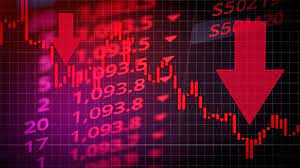
On Friday, a sharp selloff in banking equities struck European markets as concerns about the health of the financial sector increased. The news that Credit Suisse and UBS were the subject of an American investigation only made matters worse.
The STOXX 600 index for all of Europe dropped 1.5%, but a strong rebound early this week put it on course for weekly gains.
After Bloomberg News reported that UBS Group AG and Credit Suisse AG are among the banks being investigated by the U.S. Department of Justice (DOJ) for possible involvement in helping Russian billionaires avoid sanctions, the shares of both companies plummeted by 6.3% and 6.7%, respectively.
Following the bankruptcy of US midsized institutions and the upheaval at Credit Suisse, which underlined mounting dangers for banks in the wake of tightening financial conditions, European banks slumped 4.5% and were on track for their third consecutive week of falls.
With a steep increase in the cost of hedging against the risk of default, Deutsche Bank fell 11.1% and became the biggest loss on the STOXX 600 index. The powerful German company announced that it would redeem its $1.5 billion in 2028 due Tier 2 notes.
"We are still on edge waiting for another domino to fall, and Deutsche is clearly the next one on everyone's minds (fairly or unfairly). Looks like the banking crisis hasn't been entirely put to bed," said Chris Beauchamp, chief market analyst at IG.
After Reuters reported that the European Central Bank is pressuring the bank to wind down its extremely successful business in Russia, Austria's Raiffeisen Bank International fell 5.7%.
Even as the U.S. central bank indicated a pause in its rate-hiking cycle, a string of interest rate increases from the Federal Reserve and other central banks in Europe this week increased concerns about tightening financial conditions.
The STOXX 600 has surged as much as 10% at one stage but is now up just 3.5% year to date. The benchmark S&P 500 index for the United States has gained 2.8% so far this year.
According to an S&P Global poll, consumer spending on services surprisingly increased business activity across the eurozone this month, but the factory sector's decline was made worse by weaker demand for produced goods.
"Over the coming weeks, we expect to see anecdotal stories emerge of problems around credit availability, followed thereafter by renewed weakness in some of the more traditional economic indicators and ultimately in earnings revisions," said Graham Secker, equity strategist at Morgan Stanley wrote in a note.
(Source:www.financialpost.com)
The STOXX 600 index for all of Europe dropped 1.5%, but a strong rebound early this week put it on course for weekly gains.
After Bloomberg News reported that UBS Group AG and Credit Suisse AG are among the banks being investigated by the U.S. Department of Justice (DOJ) for possible involvement in helping Russian billionaires avoid sanctions, the shares of both companies plummeted by 6.3% and 6.7%, respectively.
Following the bankruptcy of US midsized institutions and the upheaval at Credit Suisse, which underlined mounting dangers for banks in the wake of tightening financial conditions, European banks slumped 4.5% and were on track for their third consecutive week of falls.
With a steep increase in the cost of hedging against the risk of default, Deutsche Bank fell 11.1% and became the biggest loss on the STOXX 600 index. The powerful German company announced that it would redeem its $1.5 billion in 2028 due Tier 2 notes.
"We are still on edge waiting for another domino to fall, and Deutsche is clearly the next one on everyone's minds (fairly or unfairly). Looks like the banking crisis hasn't been entirely put to bed," said Chris Beauchamp, chief market analyst at IG.
After Reuters reported that the European Central Bank is pressuring the bank to wind down its extremely successful business in Russia, Austria's Raiffeisen Bank International fell 5.7%.
Even as the U.S. central bank indicated a pause in its rate-hiking cycle, a string of interest rate increases from the Federal Reserve and other central banks in Europe this week increased concerns about tightening financial conditions.
The STOXX 600 has surged as much as 10% at one stage but is now up just 3.5% year to date. The benchmark S&P 500 index for the United States has gained 2.8% so far this year.
According to an S&P Global poll, consumer spending on services surprisingly increased business activity across the eurozone this month, but the factory sector's decline was made worse by weaker demand for produced goods.
"Over the coming weeks, we expect to see anecdotal stories emerge of problems around credit availability, followed thereafter by renewed weakness in some of the more traditional economic indicators and ultimately in earnings revisions," said Graham Secker, equity strategist at Morgan Stanley wrote in a note.
(Source:www.financialpost.com)





